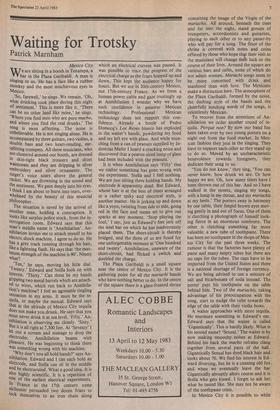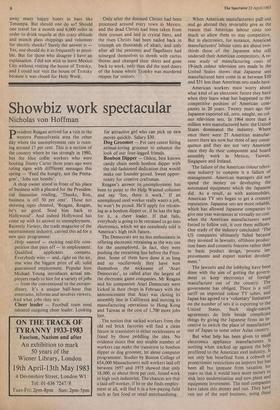Waiting for Trotsky
Patrick Marnham
We are sitting in a booth in Tenampa, a ar in the Plaza Garibaldi. A man is singing to us. He has a face like a rubber monkey and the most mischievous eyes in Mexico.
`So, farewell,' he sings. We remain. 'Oh, what drinking took place during this night of sentiment.' This is more like it. 'There can be no other land like mine,' he sings. `Where you find men who are pure macho, and where you find the real drunks.' The song is most affecting. The noise is unbelievable. He is not singing alone. He is accompanied by three guitars, two violins, a double bass and two heart-rending, ear- splitting trumpets. All these musicians:who are clustered around our booth, are dressed in skin-tight black trousers and short waistcoats and they are dripping in silver embroidery and silver ornaments. The singer's voice soars above the general racket. We are drowning in the sound and the sentiment. We gaze deeply into his eyes. I think I am about to burst into tears, over- whelmed by the beauty of this musicial philosopher.
The situation is saved by the arrival of another man, holding a contraption. It looks like surplus police stock, from the in- terrogation room. Edward says that this man's middle name is 'Annihilation'. An- nihilation invites me to attach myself to his electric shock machine. I agree to do so. He has a grey track running through his hair, like a lightning flash. He says that 'the max- imum strength of the machine is 90'. Ninety what?
'Ten,' he says, moving his little dial. `Twenty.' Edward and Stella look on with interest. 'Thirty.' Can these be my hands gripping two metal barrels which are attach- ed to wires, which run back to Annihila- tion's machine? I feel an agreeable tingling sensation in my arms. It must be the te- quila, or maybe the mescal. Edward says that at the altitude of Mexico City tequila does not make you drunk. He says that you must never drink it at sea level. 'Fifty.' An- nihilation is observing me closely. 'Sixty.' But it is all right at 7,300 feet. At 'Seventy' I let out a scream and manage to drop the electrodes. Annihilation beams with pleasure. He was beginning to think there was something wrong with his machine. `Why don't you all hold hands?' says An- nihilation. Edward and I can each hold an electrode, and Stella can sit in the middle and be electrocuted. What a good idea. It is also highly scientific. It is a repetition of one of the earliest electrical experiments. In France in the 17th century some alchemist persuaded two dozen friars to lock themselves to an iron chain along which an electrical current was passed. It was possible to trace the progress of the electrical charge as the friars hopped up and down. This kept the audience happy for hours. But we are in 20th-century Mexico, not 17th-century France. As we form a human power cable and gaze trustingly up at Annihilation I wonder why we have such confidence in amateur Mexican
technology. Professional Mexican technology does not support this con- fidence. Already a bottle of Pedro Domecq's Los Reyes blanco has exploded in the waiter's hands, powdering my food and my left eye with glass. And while mun- ching from a can of peanuts supplied by In- dustrias Mafer I heard a cracking noise and discovered that a peanut-sized lump of glass had.been included with the peanuts.
It is when Annihilation says 'Fifty' that we realise something has gone wrong with the experiment. Stella and I feel nothing. We are just sitting there holding hands. My electrode is apparently dead. But Edward, whose hair is at the best of times arranged in a rather spiky and electrical style, is another matter. He is jerking up and down like a yoyo, twisting from side to side, going red in the face and seems set to give out sparks at any moment. 'Stop playing the fool,' I say, just as Edward's feet jerk off the steel bar on which he has inadvertently placed them. The short-circuit is thereby bridged, and the three of us are fused for one unforgettable moment at 'One hundred and twenty'. Annihilation, unaware of the short-circuit, had flicked a switch and doubled the charge.
The Plaza Garibaldi is a small square near the centre of Mexico City. It is the gathering point for all the mariachi bands who have nothing better to do. In the centre of the square there is a glass-fronted shrine containing the image of the Virgin of the mariachis. All around, beneath the trees and far into the night, stand groups of trumpeters, accordionists and guitarists, playing to each other or to any passer-by who will pay for a song. The floor of the shrine is covered with notes and coins offered by those who hope that their visit to the musicians will change their luck or the course of their lives. Around the square are various bars and cafes, some of which do not admit women. Mariachi songs seem to be more concerned with drink and manhood than with love. The Mexicans make a distinction here, The atmosphere of the Plaza Garibaldi, formed by the noise, the dashing style of the bands and the cheerfully insulting words of the songs, is relentlessly Mexican.
To recover from the attentions of An- nihilation we order another round of te- quila. Porque non? By now our band has been taken over by two young porters on a night out from the food market. In Mex- ican fashion they join in the singing. They have to support each other as they stand up to do so. Moved by an uncharacteristic benevolence towards foreigners, they dedicate their song to us.
`You do not know,' they sing, 'You can never know, how drunk we are. Or how happy we are. Oh, how many times have I been thrown out of this bar. And so I have walked in the streets, singing my songs, wiih a lump in my throat, and my mariachis at my heels.' The porters sway in harmony by our table, their limpid brown eyes mov- ing gently in and out of focus. One of them is clutching a photograph of himself look- ing fierce in an enormous sombrero. The other is clutching something far more valuable: a new tube of toothpaste. There has been no toothpaste in the shops of Mex- ico City for the past three weeks. The rumour is that the factories have plenty of paste and many empty tubes but there are no caps for the tubes. The caps have to be imported from the United States and there is a national shortage of foreign currency. We are being advised to use a mixture of salt and bicarbonate of soda instead. The porter puts his toothpaste on the table behind him. Two of the mariachis, taking advantage of his preoccupation with the song, start to nudge the tube towards the edge of the table with their violin bows.
A waiter approaches with more tequila. He murmurs something in Edward's ear. Edward says that the waiter is called 'Gigantically'. This is hardly likely. What is his second name? 'Sexual.' The waiter is by now making smoochy noises at Edward. Behind his back the macho refrains clang together from several parts of the hall. Gigantically Sexual has dyed black hair and looks about 70. We find his interest in Ed- ward diverting, but he is a cunning old fox and when we eventually leave the bar Gigantically abruptly alters course and it is Stella Who gets kissed. I forget to ask her what he tasted like. She may not be aware of the toothpaste crisis.
In Mexico City it is possible to while away many happy hours in bars like Tenampa. But should one do so? Should one travel for a month and 6,000 miles in order to drink tequila at this crazy altitude and munch glass chippings and volunteer for electric shocks? Surely the answer is — Yes, one should do it as frequently as possi- ble. But for those who disagree I have an explanation. I did not wish to leave Mexico City without, visiting the house of Trotsky, and I could not visit the house of Trotsky because it was closed for Holy Week. Only after the doomed Christs had been processed around every town in Mexico, and the dead Christs had been taken from their crosses and laid in crystal biers, and the risen Christs had been nailed back in triumph on thousands of altars, and only after all the penitents and flagellants had scourged themselves to shreds with cactus thorns and changed their shirts and gone back to work, only then did the steel doors of the house where Trotsky was murdered reopen for visitors.











































 Previous page
Previous page